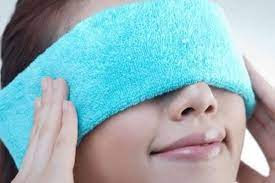Best 7 Home Remedies For Dry Eyes
You may have dry eyes if your eyes hurt and burn, appear red, or feel gritty, as if sand is lodged in them. Dry eyes , commonly known as dry eye syndrome, is a common illness that can have a negative influence on your life. When your eyes don't produce the proper sort of tears to clean out particles and maintain the surface well-lubricated, it might cause dry eyes.
When the small glands in and around your eyelids don't produce enough tears to keep your eyes healthy and your vision clear, this disease might develop. Tears maintain the surface of the eye smooth, pleasant, and moisturized, as well as washing away dust and debris and protecting it from infection, when they perform their job effectively. To keep moist, healthy eyes produce tears all day, every day. A smart first step in treating dry eyes is to make lifestyle adjustments or look for easy home treatments.
1. Warm Compresses
Applying a warm compress to your eyes improves blood circulation and encourages tear production. Soak a lint-free cloth in warm water for ten minutes, rinse it out, and place it over your eyes. Rewet the compress with additional warm water if it becomes dry. When you're finished, rinse your eyes with lukewarm water. The moist heat aids in the loosening of blocked gland oils. Wet the fabric frequently to keep it warm. Even when your eyes feel better, you may need to use warm compresses every day to help reduce inflammation. As much as possible, prepare your compress in a clean and sanitary atmosphere .
2. Wash Crusty Lashes.
Cleaning your eyelids, as well as the skin and hair around them, will help reduce lid irritation. Another technique to assist your body generate better quality tears is to keep your eyes clean. Use a mild cleanser, such as baby shampoo. To make suds, rub a little between your fingertips. Close your eyes and gently massage the soap around your eyelashes into the base of your eyelids. Rinse your eyes with warm water while keeping your eyes closed. Before administering a warm compress, this method of cleansing is advised.
3. Blinking Regularly
We tend to take blinking for granted, but the AOA recommends intentionally blinking more frequently to assist with dry eye. Blinking aids in the renewal of tear film, which protects and moisturizes the eyes. The quantity of times you blink each minute is reduced when you stare at a computer screen. When you're online, try to blink a lot. Every 20 minutes, close your eyes for 20 seconds.. Setting your computer screen below eye level is another simple way to keep your eyes moist when at the computer. You won't have to open your eyes as wide, which may aid in the slowing of tear evaporation between blinks.
4. Stay Hydrated
Your eyes, like every other part of your body, require water to be healthy. Drinking water keeps them hydrated. But don't drink water until you're thirsty. You may already be dehydrated at this point. Rather, strive for eight to ten glasses of water each day. If you don't like plain water, any other non-alcoholic or caffeine-free beverage can suffice. Cucumbers and watermelon, for example, are high in water. One method to tell if you're properly hydrated is to: Take a look at your urine. You're probably receiving enough fluids if it's white or light yellow.
5. Supplement Your Diet with Essential Fatty Acids and Vitamins
Omega-3 oils help to enhance the function of the gland that generates tears and can help to alleviate dry eye symptoms naturally. Fish oil can be obtained via supplements or by eating fatty fish. Omega-3 fatty acids appear to help enhance the oil film formed by the Meibomian glands, which are located on the border of the eyelid. Omega-3 may be found in the following foods
Fatty fish such as salmon and tuna
Fish oil supplements
Flax seeds
Chia seeds
Walnuts
Palm and soybean oil
Eating a nutritious and well-balanced diet benefits your entire body, including your eyes. Omega-3 fatty acids may be found in foods such as fish and flax seeds, as well as taken as a supplement. When combined with a balanced diet and a healthy lifestyle, the health advantages of omega-3 fatty acids might potentially alleviate symptoms of dry eyes. Dry eyes can be caused by a lack of vitamins A and D. As a result, taking vitamin A and D supplements may help to alleviate symptoms. However, further study is needed to validate this relationship. Before adding supplements to your regimen or substantially altering your food, speak with a health care provider.
6. Eye Drops.
Over-the-counter eye drops act similarly to your own tears and may be of assistance. There are several brands to choose from. Some contain preservatives to extend their shelf life, but applying them too frequently might irritate your eyes. Preservative-containing eye drops might irritate the eyes, especially if they're taken more than four times per day. Eye drops for redness might irritate your eyes even more, so be sure you're using ones designed for dry eyes. Non-preservative eye drops, as well as heavier ointments, are also available. Your doctor can tell you if they will help or if you require more treatment.
7. Avoid Alcohol and Smoking.
To ensure that your dry eyes are being handled properly, discuss any suspected eye-related concerns with your eye care practitioner. To maintain your eyes clean and working as well as possible, you can combine natural and medicinal treatments in many instances. Mild and transitory cases of the disease may be treated with home treatments. It's time to consult a skilled medical eye expert if the symptoms persist or worsen, or if you acquire new symptoms. These signs and symptoms might indicate that dry eye is a symptom of something more serious.







Comments
Post a Comment